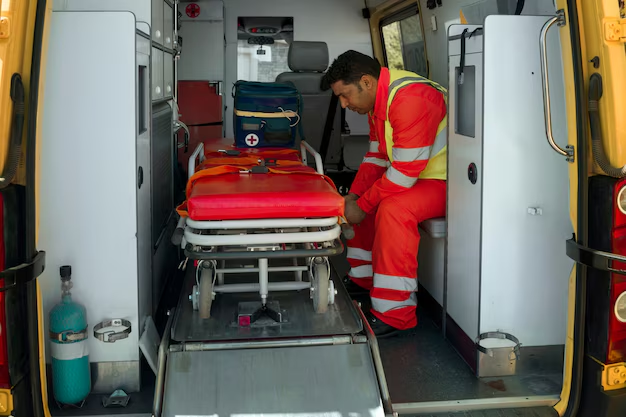Your Guide to Does Medicare Cover Cost Of Ambulance
What You Get:
Free Guide
Free, helpful information about Medicare FAQ and related Does Medicare Cover Cost Of Ambulance topics.
Helpful Information
Get clear and easy-to-understand details about Does Medicare Cover Cost Of Ambulance topics and resources.
Personalized Offers
Answer a few optional questions to receive offers or information related to Medicare FAQ. The survey is optional and not required to access your free guide.
Is Medicare Covering Your Ambulance Costs? Here’s What You Need to Know
Emergencies strike unexpectedly, and when they do, swift medical attention can make all the difference. For many, an ambulance ride is essential in critical moments, but the looming question is, does Medicare cover the cost of an ambulance?
Understanding Medicare's Coverage
Medicare offers health insurance coverage for individuals aged 65 and older, as well as certain younger people with disabilities. Medicare Part B, the section that deals with outpatient care, covers some of the costs associated with ambulance services, but there are specific guidelines:
Emergent Situations Only: Medicare Part B covers ambulance services only if other transportation could endanger your health. The transport has to be to the nearest appropriate medical facility.
Medically Necessary: The ambulance ride must be considered necessary from a medical standpoint.
Specific Scenarios: Instances like being unconscious, in shock, or heavily bleeding typically warrant coverage. Non-emergency situations might not be covered unless pre-approved.
While Medicare can alleviate some of the costs, it often doesn’t cover the entire bill, leaving beneficiaries responsible for coinsurance or copayments.
When Medicare Might Not Cover Ambulance Costs
If you're in a situation where Medicare rejects your ambulance ride, it's crucial to explore other avenues. Medicare Advantage Plans, offered by private insurers approved by Medicare, may provide broader coverage that could include additional ambulance services. However, costs and conditions vary greatly between plans.
Steps to Take If Stuck with a Bill
Dealing with unexpected medical bills can be daunting. Here are some strategies to consider:
Appeal the Decision: Don’t hesitate to contest the decision if you think it was unjustly denied. Gather all necessary documents and evidence to support your claim.
Negotiation with Providers: Direct communication with the ambulance service can sometimes open doors to discounted settlements or payment plans.
Ambulance services, especially in emergencies, can be financially overwhelming. Fortunately, several government aid programs and financial assistance options exist to support those encountering hefty bills.
Exploring Broader Financial Assistance
Even beyond ambulance services, navigating health costs can lead one to seek broader financial stability solutions. Consider these:
Medicaid: For those who qualify, Medicaid can provide comprehensive coverage, sometimes including services not fully covered by Medicare.
Debt Relief Programs: Manage overwhelming medical or other debts through structured relief options tailored to individuals’ needs.
Credit Card Solutions: Some credit cards offer medical expense management or low interest on medical purchases. Cautiously leveraging these might ease financial strain.
Turning to broader financial resources not only helps manage immediate concerns but also strengthens one’s overall financial health. Seizing educational opportunities, like grants and scholarships, might also enhance employability and income stability, contributing to long-term financial security.
Quick Reference Guide to Financial Assistance 📋
Medicaid: Aiding low-income individuals with comprehensive health coverage.
Medicare Advantage Plans: For extended coverage beyond original Medicare options.
Medical Debt Relief Programs: Tailored strategies to manage and reduce debt.
Government and Non-Profit Grants: Explore opportunities for easing health-related expenses.
Educational Grants and Scholarships: Further education to improve career prospects and financial status.
When assessing Medicare’s coverage and financial assistance options, always stay informed and proactive. This will lead to greater control over health and financial challenges, ensuring you're prepared when you need it most.
What You Get:
Free Medicare FAQ Guide
Free, helpful information about Does Medicare Cover Cost Of Ambulance and related resources.

Helpful Information
Get clear, easy-to-understand details about Does Medicare Cover Cost Of Ambulance topics.

Optional Personalized Offers
Answer a few optional questions to see offers or information related to Medicare FAQ. Participation is not required to get your free guide.


Discover More
- a Medical Provider That Accepts Medicare Assignment Must
- a Medical Provider That Accepts Medicare Assignment Must Quizlet
- a Medicare Patient Received Treatment That Isn't Covered By Medicare
- a Medicare Patient Receives Treatment That Isn't Covered By Medicare
- a Medicare Supplement Basic Benefit Is Quizlet
- a Medicare Supplement Companies
- a Medicare Supplement Policy Is Quizlet
- a Medicare Supplement Policy Must Not Contain Benefits Which
- a Patient Received Treatment In August Medicare
- Am I Eligible For Medicare
